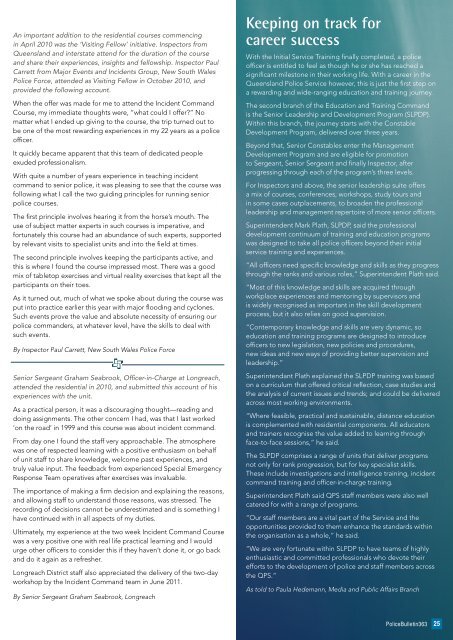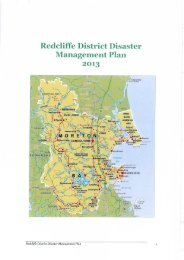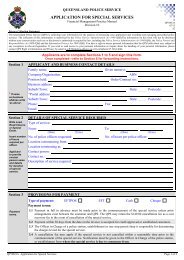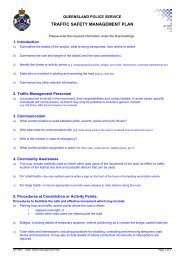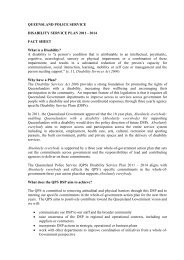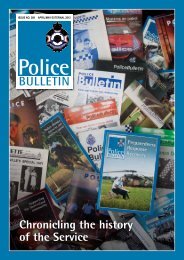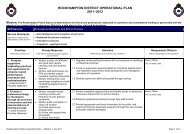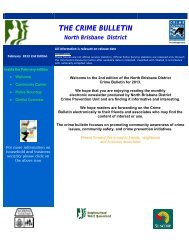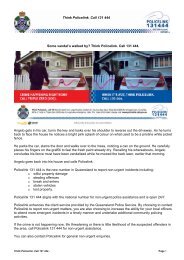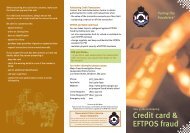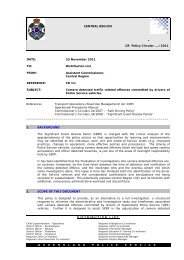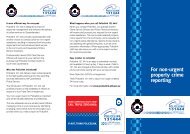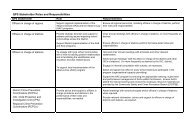Training Command - Queensland Police Service - Queensland ...
Training Command - Queensland Police Service - Queensland ...
Training Command - Queensland Police Service - Queensland ...
Create successful ePaper yourself
Turn your PDF publications into a flip-book with our unique Google optimized e-Paper software.
An important addition to the residential courses commencing<br />
in April 2010 was the ‘Visiting Fellow’ initiative. Inspectors from<br />
<strong>Queensland</strong> and interstate attend for the duration of the course<br />
and share their experiences, insights and fellowship. Inspector Paul<br />
Carrett from Major Events and Incidents Group, New South Wales<br />
<strong>Police</strong> Force, attended as Visiting Fellow in October 2010, and<br />
provided the following account.<br />
When the offer was made for me to attend the Incident <strong>Command</strong><br />
Course, my immediate thoughts were, “what could I offer?” No<br />
matter what I ended up giving to the course, the trip turned out to<br />
be one of the most rewarding experiences in my 22 years as a police<br />
officer.<br />
It quickly became apparent that this team of dedicated people<br />
exuded professionalism.<br />
With quite a number of years experience in teaching incident<br />
command to senior police, it was pleasing to see that the course was<br />
following what I call the two guiding principles for running senior<br />
police courses.<br />
The first principle involves hearing it from the horse’s mouth. The<br />
use of subject matter experts in such courses is imperative, and<br />
fortunately this course had an abundance of such experts, supported<br />
by relevant visits to specialist units and into the field at times.<br />
The second principle involves keeping the participants active, and<br />
this is where I found the course impressed most. There was a good<br />
mix of tabletop exercises and virtual reality exercises that kept all the<br />
participants on their toes.<br />
As it turned out, much of what we spoke about during the course was<br />
put into practice earlier this year with major flooding and cyclones.<br />
Such events prove the value and absolute necessity of ensuring our<br />
police commanders, at whatever level, have the skills to deal with<br />
such events.<br />
By Inspector Paul Carrett, New South Wales <strong>Police</strong> Force<br />
Senior Sergeant Graham Seabrook, Officer-in-Charge at Longreach,<br />
attended the residential in 2010, and submitted this account of his<br />
experiences with the unit.<br />
As a practical person, it was a discouraging thought—reading and<br />
doing assignments. The other concern I had, was that I last worked<br />
‘on the road’ in 1999 and this course was about incident command.<br />
From day one I found the staff very approachable. The atmosphere<br />
was one of respected learning with a positive enthusiasm on behalf<br />
of unit staff to share knowledge, welcome past experiences, and<br />
truly value input. The feedback from experienced Special Emergency<br />
Response Team operatives after exercises was invaluable.<br />
The importance of making a firm decision and explaining the reasons,<br />
and allowing staff to understand those reasons, was stressed. The<br />
recording of decisions cannot be underestimated and is something I<br />
have continued with in all aspects of my duties.<br />
Ultimately, my experience at the two week Incident <strong>Command</strong> Course<br />
was a very positive one with real life practical learning and I would<br />
urge other officers to consider this if they haven’t done it, or go back<br />
and do it again as a refresher.<br />
Longreach District staff also appreciated the delivery of the two-day<br />
workshop by the Incident <strong>Command</strong> team in June 2011.<br />
By Senior Sergeant Graham Seabrook, Longreach<br />
Keeping on track for<br />
career success<br />
With the Initial <strong>Service</strong> <strong>Training</strong> finally completed, a police<br />
officer is entitled to feel as though he or she has reached a<br />
significant milestone in their working life. With a career in the<br />
<strong>Queensland</strong> <strong>Police</strong> <strong>Service</strong> however, this is just the first step on<br />
a rewarding and wide-ranging education and training journey.<br />
The second branch of the Education and <strong>Training</strong> <strong>Command</strong><br />
is the Senior Leadership and Development Program (SLPDP).<br />
Within this branch, the journey starts with the Constable<br />
Development Program, delivered over three years.<br />
Beyond that, Senior Constables enter the Management<br />
Development Program and are eligible for promotion<br />
to Sergeant, Senior Sergeant and finally Inspector, after<br />
progressing through each of the program’s three levels.<br />
For Inspectors and above, the senior leadership suite offers<br />
a mix of courses, conferences, workshops, study tours and<br />
in some cases outplacements, to broaden the professional<br />
leadership and management repertoire of more senior officers.<br />
Superintendent Mark Plath, SLPDP, said the professional<br />
development continuum of training and education programs<br />
was designed to take all police officers beyond their initial<br />
service training and experiences.<br />
“All officers need specific knowledge and skills as they progress<br />
through the ranks and various roles,” Superintendent Plath said.<br />
“Most of this knowledge and skills are acquired through<br />
workplace experiences and mentoring by supervisors and<br />
is widely recognised as important in the skill development<br />
process, but it also relies on good supervision.<br />
“Contemporary knowledge and skills are very dynamic, so<br />
education and training programs are designed to introduce<br />
officers to new legislation, new policies and procedures,<br />
new ideas and new ways of providing better supervision and<br />
leadership.”<br />
Superintendant Plath explained the SLPDP training was based<br />
on a curriculum that offered critical reflection, case studies and<br />
the analysis of current issues and trends; and could be delivered<br />
across most working environments.<br />
“Where feasible, practical and sustainable, distance education<br />
is complemented with residential components. All educators<br />
and trainers recognise the value added to learning through<br />
face-to-face sessions,” he said.<br />
The SLPDP comprises a range of units that deliver programs<br />
not only for rank progression, but for key specialist skills.<br />
These include investigations and intelligence training, incident<br />
command training and officer-in-charge training.<br />
Superintendent Plath said QPS staff members were also well<br />
catered for with a range of programs.<br />
“Our staff members are a vital part of the <strong>Service</strong> and the<br />
opportunities provided to them enhance the standards within<br />
the organisation as a whole,” he said.<br />
“We are very fortunate within SLPDP to have teams of highly<br />
enthusiastic and committed professionals who devote their<br />
efforts to the development of police and staff members across<br />
the QPS.”<br />
As told to Paula Hedemann, Media and Public Affairs Branch<br />
<strong>Police</strong>Bulletin363 25


